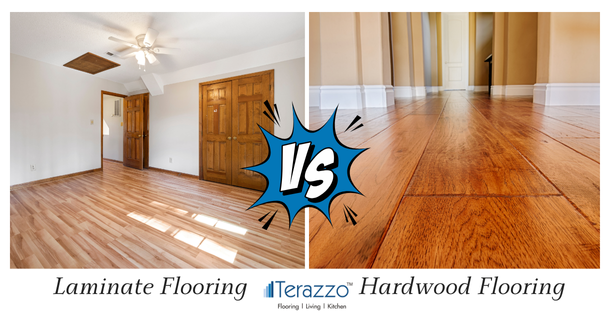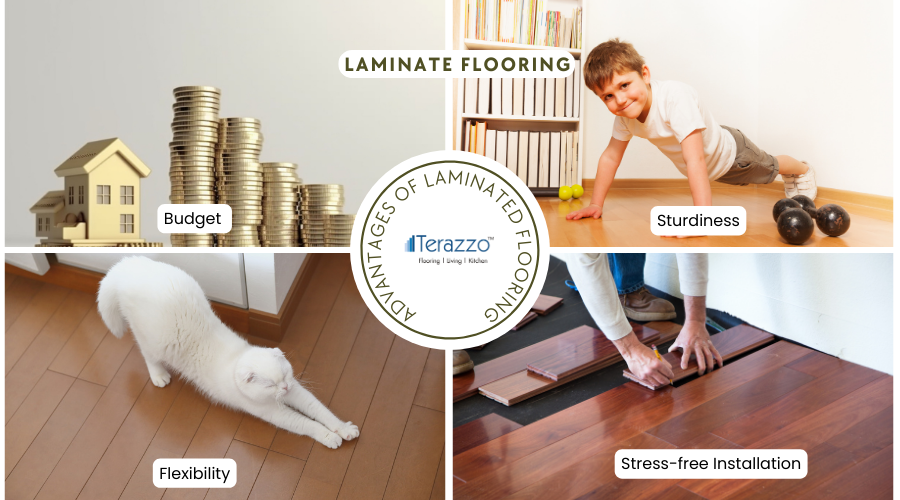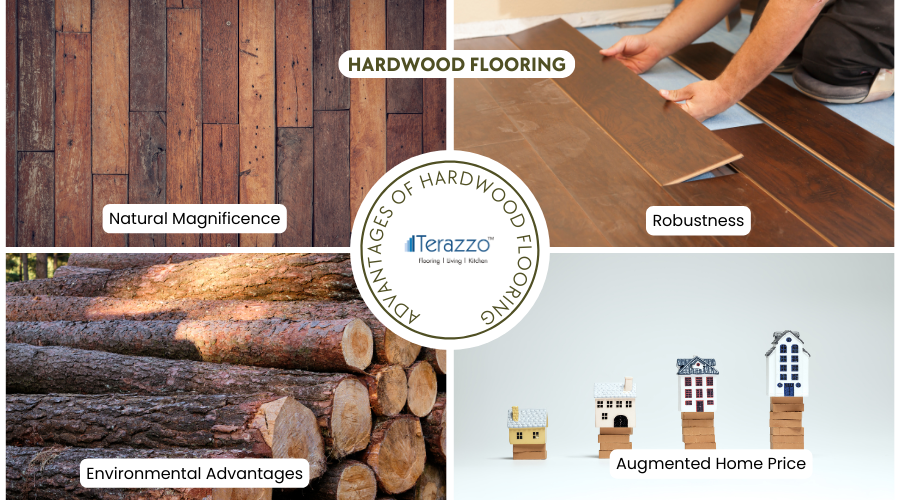Summary
Consider renovating your home with some fashionable new wood-look floors. Cheers, pal! You’ve come to the right place! We like dreaming about the comfortable attraction of a new wood surface. But if you’ve been investigating laminate flooring or hardwood flooring types, you probably have a few questions. It’s fathomable. The laminate vs. hardwood flooring discussion is normal. Although they have the same appearance, these types of flooring are truly dissimilar. But don’t fear; we will clear all your queries in this blog post!
Share via:

Which flooring is best Laminate Flooring or Hardwood Flooring? – Making the #1 Right Choice
Consider renovating your home with some fashionable new wood-look floors. Cheers, pal! You’ve come to the right place! We like dreaming about the comfortable attraction of a new wood surface. But if you’ve been investigating laminate flooring or hardwood flooring types, you probably have a few questions. It’s fathomable. The laminate vs. hardwood flooring discussion is normal. Although they have the same appearance, these types of flooring are truly dissimilar. But don’t fear; we will clear all your queries in this blog post!
We’re going to discuss which flooring is best: laminate flooring or hardwood flooring What is the downside to laminate flooring, Is laminate flooring as good as hardwood flooring, What flooring is better than laminate, And does laminate flooring increase property value?
Which flooring is better, laminate flooring or hardwood flooring?
Picking the correct flooring for your residence is an important decision that stabilizes aesthetics, robustness, and budget. Both laminate flooring and hardwood flooring offer exceptional advantages, making the choice a matter of personal preference and practicality. Let’s discover the facets of each to help you decide which option suits your requirements the best.
Laminate Flooring

Affordability: Laminate flooring is often more budget-friendly than hardwood, making it an eye-catching selection for homeowners looking to attain the look of wood without breaking the bank. Its lower price point permits cost-effective home improvements and upgrades.
Sturdiness: Engineered for flexibility, laminate flooring is highly resistant to abrasions, stains, and fading, making it perfect for high-traffic areas. Its strong outer layer offers protection against wear and tear, ensuring long-term attractiveness and performance.
Flexibility: With a wide range of designs and patterns available, laminate flooring offers versatility in style. Whether you prefer the classic look of oak or the modern appeal of tile, there’s a laminate option to suit every aesthetic preference and interior scheme.
Stress-free Installation: Laminate flooring contains a click-lock installation system that streamlines the installation process, making it appropriate for DIY enthusiasts. Unlike hardwood, which needs proficient expertise for accurate fitting and finishing, laminate can be fitted rapidly and with the least effort.
Hardwood Flooring:
Natural Magnificence: Hardwood flooring radiates timeless stylishness and superiority, adding cordiality and appeal to any space. Its natural grain designs and rich tones create a lavish environment that enriches the overall aesthetic of your home.
Robustness: High-quality hardwood floors are well-known for their robustness and endurance. With good care and maintenance, hardwood flooring can last for generations, making it a valuable investment for homeowners looking for lasting quality and value.
Environmental Advantages: Hardwood flooring is a maintainable choice, as it is obtained from renewable forests and can be reused at the end of its lifecycle. Choosing hardwood encourages environmental responsibility while adding natural beauty to your home.
Augmented Home Price: Residences with hardwood flooring usually demand higher resale values when compared to laminate or other types of flooring. Its enduring appeal and first-class quality make it a desired aspect for prospective buyers, resulting in a higher return on investment.
While laminate flooring or hardwood flooring may seem similar, almost every other feature is different cost, maintenance, lifetime, installation, and resale value for each differ. Hardwood flooring is a major financial investment, but its upfront cost can be valuable if you expect to stay in the home for several years.
Reader’s tip: Always take lighting and foot traffic into account. A glossy surface in a bright hallway might reflect too much light, while a rough texture in a bedroom can feel warmer and richer.
What is the downside to laminate flooring?
When picking laminate flooring or hardwood flooring, laminate flooring has become an essential pick for several homeowners, offering an eye-catching blend of affordability and robustness. On the other hand, it is vital to acknowledge the potential downside that comes with this popular flooring choice.
- Incompetent to refinish this flooring
- Not natural
- Tough
- Not strong
- Contains a few hazardous chemical compounds
- Create some unwanted noise
- Can be slippery
Is laminate flooring as good as hardwood flooring?

In the area of home flooring choices, the debate between laminate flooring and hardwood flooring is an enduring one. However, while hardwood flooring has long been valued for its enduring appeal and sturdiness, laminate flooring has developed as a captivating substitute with its own set of advantages.
Let’s explore whether laminate flooring can embrace its advantages over hardwood flooring.
Robustness and Flexibility:One of the usual untruths about laminate flooring is its poorer robustness when compared to hardwood. Though, indeed, laminate is not solid wood, it boasts amazing pliability because of its multi-layer structure. The top layer of laminate flooring is protected with aluminum oxide, making it highly resilient to scratches, dents, and stains. This sturdiness makes laminate flooring a perfect choice for high-traffic areas and homes with pets or children, where hardwood may show signs of wear and tear over time.
Visual Appeal and Authenticity:Another mistaken belief is that laminate flooring lacks the authenticity and attraction of hardwood. On the other hand, modern laminate flooring imitates the natural beauty of wood with amazing precision. High-definition printing technology and embossing methods create laminate planks that meticulously mimic the grain patterns, textures, and shades of hardwood. From rustic oak to sleek walnut, laminate flooring offers a varied range of styles and finishes to suit any design preference, without the large price tag of hardwood.
Environmental Concerns:Anxieties about the environmental impact of flooring materials are becoming increasingly prevalent. While hardwood flooring is a natural resource that can be sustainably harvested, laminate flooring offers eco-friendly attributes of its own. Many laminate products are made from recycled materials and certified by reputable organizations for low volatile organic compounds (VOCs) emissions. Additionally, laminate flooring’s lifetime and minimal need for refining contribute to its eco-conscious appeal.
What flooring is better than laminate?
Laminate flooring has long been a trendy pick for homeowners due to its affordability and usefulness. However, as technology progresses and customer preferences change, several flooring options have developed as worthwhile alternatives, offering exceptional benefits and augmenting the aesthetic appeal of any space. Let’s take a closer look at some flooring options that are better laminated in several facets:
Vinyl Plank Flooring: Perfect for high-traffic areas and moisture-prone spaces like kitchens and bathrooms, vinyl plank flooring offers the look of hardwood without the cost or maintenance. With developments in technology, modern vinyl planks imitate the texture and grain patterns of real wood, offering a budget-friendly alternative to laminate with superior water resistance and robustness.
Engineered Wood Flooring: Combining the natural beauty of hardwood with improved stability, engineered wood flooring is built from multiple layers of wood veneers merged. This innovative design reduces the risk of warping and expansion, making it appropriate for installation in areas where solid hardwood may be impossible, such as basements or over-radiant heating systems.
Bamboo Flooring: As an eco-friendly and maintainable option, bamboo flooring has gained attractiveness for its exceptional aesthetic appeal and environmental benefits. With a similar hardness to hardwood, bamboo flooring is extremely durable and resistant to moisture, making it suitable for many living spaces. Additionally, its quick renewability and minimal environmental impact make it a gorgeous pick for environmentally conscious consumers.
Porcelain Tile Flooring: Offering unparalleled sturdiness and versatility, porcelain tile flooring is an exceptional choice for homeowners looking for a low-maintenance alternative to laminate. Available in a wide array of colors, patterns, and textures, porcelain tiles can imitate the look of natural stone or hardwood with superior resistance to scratches, stains, and moisture.
Does laminate flooring increase property value?
Most people will aim to do everything that they can to increase the market value of their property or home. It can at times be alleged that this is a matter only for those with instantaneous plans to sell and move somewhere else, but that is certainly not the case.
Of course, it does apply to proprietors in that position, but your home is a possession, and increasing its value is always a good idea. You may want to shift in the future, and being capable of getting the best value for your present home will help you with that.
Flooring is one part of the home that can be improved to increase its market value. When deciding between laminate flooring and Hardwood Flooring. Laminate is a trendy floor pick, but will it increase the value of a home?
Yes, Laminate is a floor choice that can meticulously imitate the look of other required types of material, like hardwood, at a much lesser cost to the consumer. That makes it a very prevalent selection for people who want a striking floor on a limited budget, and strong visual appeal can help increase the value of a home.
Which flooring is best Laminate Flooring or Hardwood Flooring?
When considering the right flooring material for your home, laminate flooring or hardwood flooring you must think about your present lifestyle and also what it could be like in the future. Think about what each type of flooring has to offer, evaluate the pros and cons, and determine what you’re looking for in a flooring product. The flooring you pick might come down to price, or it could be all about the vision you have for your home. It may be a short-term or long-term solution.
If you’re thinking about selling your home soon and want to know which flooring is best for resale, speak to the best wooden flooring company in Coimbatore. You can ask them for the final piece of advice. Consider your flooring options a second time. Fix it only once!
